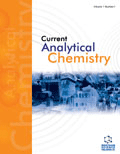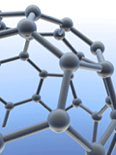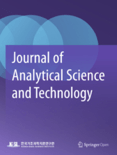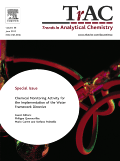
MICROCHIMICA ACTA
metrics 2024
Elevating Research in the Heart of Chemistry
Introduction
Microchimica Acta is a prestigious journal in the field of Analytical Chemistry, published by Springer Wien. With a history spanning nearly a century, since its inception in 1926, this journal continues to play a significant role in advancing chemical research, currently ranking #18 out of 156 in its category according to Scopus, placing it within the top 88th percentile. Microchimica Acta publishes high-quality, peer-reviewed articles that cover a diverse range of topics in analytical techniques, instrumentation, and methodologies. Researchers and professionals alike benefit from its comprehensive scope, which fosters innovation and knowledge-sharing in the analytical chemistry community. Despite its non-open-access model, the journal is committed to disseminating critical findings that drive progress in academia and industry, ensuring its relevance in a continually evolving field. As an essential resource, Microchimica Acta not only contributes significantly to scholarly discourse but also provides a platform for emerging concepts and practices in the analytical landscape.
Metrics 2024
 0.85
0.85 5.30
5.30 5.00
5.00 108
108Metrics History
Rank 2024
Scopus
IF (Web Of Science)
JCI (Web Of Science)
Quartile History
Similar Journals

Pakistan Journal of Analytical & Environmental Chemistry
Championing Excellence in Analytical and Environmental StudiesPakistan Journal of Analytical & Environmental Chemistry, published by the University of Sindh, National Centre of Excellence Analytical Chemistry, is a distinguished platform that has been committed to promoting high-quality research in the fields of analytical and environmental chemistry since its inception. With an ISSN of 1996-918X and an E-ISSN of 2221-5255, this journal has established itself as an open-access resource since 2007, facilitating the dissemination of knowledge to a global audience. Acknowledged for its contributions, the journal currently holds a Q4 category ranking in both Analytical Chemistry and Environmental Chemistry as of 2023, with Scopus rankings placing it within the challenging competitive bracket. The journal aims to publish original research, reviews, and technical notes that elucidate contemporary challenges and advancements, making it an essential read for researchers, professionals, and students who are exploring innovative methodologies and solutions in chemical analysis and environmental monitoring. By fostering a collaborative research environment and encouraging multidisciplinary approaches, the Pakistan Journal of Analytical & Environmental Chemistry plays a crucial role in advancing the field and addressing environmental concerns in Pakistan and beyond.

Brazilian Journal of Analytical Chemistry
Empowering Researchers Through Open Access KnowledgeBrazilian Journal of Analytical Chemistry, published by VISAO FOKKA COMMUNICATION AGENCY, serves as a vital platform for those engaged in the field of analytical chemistry, especially within the Latin American context. With an ISSN of 2179-3425 and an E-ISSN of 2179-3433, this journal aims to promote high-quality research and advancements in analytical methodologies, instrumentation, and applications spanning from 2010 to the present. Although it currently holds a Q4 rank in Analytical Chemistry by Scopus and is placed at the 24th percentile, its commitment to open access publishing provides invaluable opportunities for widespread dissemination of knowledge, catering to researchers, professionals, and students alike. The journal's editorial board comprises emerging and established experts aiming to bridge gaps in analytical chemistry research, particularly in a Brazilian and broader South American context. Situated in São Paulo, Brazil, the journal's role in fostering innovation and collaboration in analytical techniques makes it an essential resource for the academic community.

Current Analytical Chemistry
Bridging research and application in analytical chemistry.Current Analytical Chemistry is a pivotal journal in the field of analytical chemistry, published by Bentham Science Publishers Ltd. Established to bridge the gap between fundamental research and practical applications, this journal offers a platform for the dissemination of significant advancements and innovations from the realms of chemical analysis techniques and methodologies. With an impressive scope covering both theoretical and applied analyses, it has successfully secured a Q3 category ranking in the 2023 metrics of Analytical Chemistry, positioned at #75 out of 156 in the Scopus rankings. Researchers, professionals, and students can expect to engage with high-quality content that reflects the latest trends and issues within the discipline. Although it currently does not offer Open Access options, the journal continuously strives to maintain high editorial standards that contribute to its impactful presence in the academic community. The convergence of ideas from 2006 to 2024 promises to uphold its reputation as a reliable source for cutting-edge research in analytical chemistry.

Annual Review of Analytical Chemistry
Navigating the Landscape of Analytical AdvancementsAnnual Review of Analytical Chemistry, published by Annual Reviews, is a premier journal that serves as a critical resource in the field of analytical chemistry, providing comprehensive and cutting-edge reviews that synthesize recent advancements and pivotal research findings. With an impressive impact factor and ranked Q1 in both Analytical Chemistry and Miscellaneous Medicine, it stands as a leader in disseminating knowledge that spans the intricacies of chemical analysis, enhancing the scientific discourse within the community. Available in both print (ISSN: 1936-1327) and online (E-ISSN: 1936-1335), the journal is accessible to a wide audience, fostering innovation and collaboration among researchers, professionals, and students alike. Its scope includes the converged years from 2008 to 2024, showcasing its commitment to providing relevant and timely insights that impact practice and education in analytical techniques, methodologies, and applications. The Scopus rank of #6 out of 156 in Analytical Chemistry, placing it in the 96th percentile, underscores its significance and the high regard in which it is held. As you explore the journal's offerings, you will find a wealth of knowledge that not only informs but inspires future discoveries in the realm of analytical chemistry.

TALANTA
Leading Discoveries in Spectroscopy and BiochemistryTALANTA, published by Elsevier, is a premier international journal that serves as a vital platform in the field of analytical chemistry. Since its inception in 1958, TALANTA has provided a comprehensive forum for the dissemination of groundbreaking research and developments in chemical analysis, spanning a wide array of topics including biochemistry and spectroscopy. With an impressive impact factor and ranking in the Q1 quartile within its category for 2023, it is ranked #12 out of 156 journals in Analytical Chemistry by Scopus, placing it among the most influential journals in its field. Researchers, professionals, and students benefit from its stringent peer-review process and high-quality content that drives advancements in analytical methodologies and applications. TALANTA's commitment to fostering innovation and excellence in research makes it an indispensable resource for anyone at the forefront of scientific inquiry.

Analytical & Bioanalytical Electrochemistry
Unleashing Insights in Analytical and Bioanalytical ScienceAnalytical & Bioanalytical Electrochemistry is a pivotal journal dedicated to the advancement of research and innovation in the fields of analytical chemistry and electrochemistry. Published by the University of Tehran, Faculty of Chemistry, Center of Excellence in Electrochemistry, this journal has been contributing to the scientific community since its inception in 2009 and continues to be a critical platform through 2024. With an ISSN of 2008-4226, it focuses on a variety of topics including electrochemical sensors, bioanalytical techniques, and innovative methodologies in electrochemical analysis. Although it currently holds a Q4 quartile ranking in both analytical chemistry and electrochemistry categories, its unique insights and research findings are essential for advancing knowledge and fostering interdisciplinary collaboration within the scientific community. Researchers, professionals, and students engaged in these dynamic fields will find valuable resources and contribute to the ongoing discourse by publishing their work in this journal. We invite you to explore and engage with the diverse content that Analytical & Bioanalytical Electrochemistry offers to enhance your research and professional development.

CHINESE JOURNAL OF ANALYTICAL CHEMISTRY
Exploring the Depths of Analytical ChemistryCHINESE JOURNAL OF ANALYTICAL CHEMISTRY, published by SCIENCE PRESS in China, stands as a prominent platform in the field of analytical chemistry since its inception in 1989. With its ISSN 0253-3820 and E-ISSN 1872-2040, the journal maintains a vital role in disseminating empirical research and innovative methodologies, contributing to the advancement of analytical techniques and their applications. The 2023 Scopus ranking positions the journal in the third quartile (Q3) within its category, reflecting a respectable standing among its peers. Researchers, professionals, and students alike engage with a broad range of topics, from instrumental analysis to environmental monitoring, each aiming to foster further scientific inquiry. Although it does not currently offer Open Access, the journal's rich repository of knowledge continues to be an essential resource for those in the analytical chemistry community, with an enduring commitment to scientific excellence and collaboration.

Journal of Analytical Science and Technology
Advancing the Frontiers of Analytical Science and TechnologyJournal of Analytical Science and Technology, published by SPRINGER INT PUBL AG, stands as a pioneering platform in the fields of Analytical Chemistry and Environmental Science. With an ISSN of 2093-3134 and E-ISSN 2093-3371, this Open Access journal, available since 2013, provides esteemed researchers with an opportunity to disseminate innovative research across a broad spectrum of applied science disciplines. The journal features a comprehensive range of studies addressing pivotal issues within Biochemistry, Genetics, Molecular Biology, Materials Science, and Physics, demonstrated by its impressive 2023 Scopus rankings in multiple categories, including Q2 in Chemistry and Environmental Science. Positioned within the UK and served from Switzerland, the journal actively encourages contributions that contribute to both practical applications and theoretical advancements, playing a vital role in fostering knowledge and collaboration among professionals, researchers, and students alike. Engage with the Journal of Analytical Science and Technology to contribute to and explore groundbreaking advancements within the analytical sciences.

JOURNAL OF ANALYTICAL CHEMISTRY
Empowering Researchers in Analytical ExcellenceJOURNAL OF ANALYTICAL CHEMISTRY, published by PLEIADES PUBLISHING INC, stands as a pivotal resource in the field of analytical chemistry, offering an innovative platform for researchers, professionals, and students to advance their knowledge and contribute to the discourse within the discipline. With an ISSN of 1061-9348 and an E-ISSN of 1608-3199, this journal features a focused exploration of analytical methodologies, instrumentation developments, and applications across various domains, contributing to practical and theoretical advancements in the field. Currently ranked in the Q3 category in Analytical Chemistry with a Scopus rank of #111 out of 156, it provides critical insights and innovation strategies for professionals aiming to enhance their analytical capabilities. Access to the journal is through standard subscription models, and it covers an extensive range of topics pertinent to the discipline from 1996 to 2024. Engage with the JOURNAL OF ANALYTICAL CHEMISTRY to be part of a vibrant research community dedicated to push the boundaries of analytical practices.

TRAC-TRENDS IN ANALYTICAL CHEMISTRY
Connecting Researchers for a Brighter Analytical FutureTRAC - Trends in Analytical Chemistry is a prestigious journal published by Elsevier Science Ltd, situated in the Netherlands. With an impressive impact factor reflected in its Q1 rankings across three major categories—Analytical Chemistry, Environmental Chemistry, and Spectroscopy—this journal stands at the forefront of disseminating pioneering research and advancements in the field of analytical chemistry. Established in 1981, TRAC provides a comprehensive platform for researchers to share influential studies and insights related to the latest trends, methodologies, and technologies in analytical techniques. Recognized globally, the journal excels in fostering cross-disciplinary dialogue and innovation, making it an indispensable resource for academics, professionals, and students alike. Explore the latest issues to stay abreast of cutting-edge developments that shape the analytical sciences.